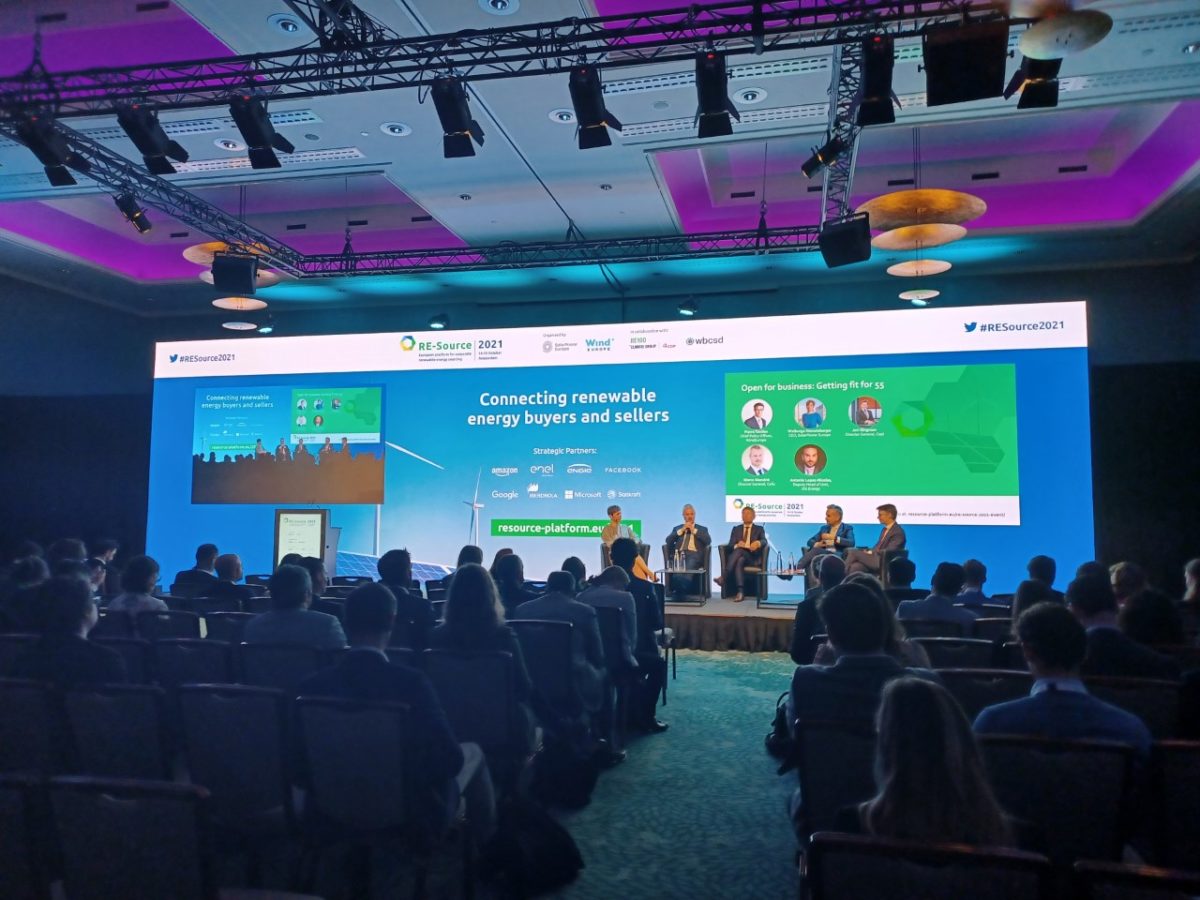Re-Source 2021 is underway in Amsterdam with an eager audience and a keen motivation to make the ‘deals' happen for a fast renewable energy transition.
The event began with an acknowledgment of the hour at hand, coming just a day after the European Commission endorsed corporate renewable Power Purchase Agreements (PPAs) as part of the answer to surging energy prices, and just weeks before COP26 in Glasgow, Scotland.
Sustainable electricity and corporates’ critical solar role
SolarPower Europe CEO Walburga Hemetsberger said the timing of Re-Source 2021 was ideal. And that as the heads of states prepare to meet in Glasgow at the end of October, private sector companies, “are taking their responsibility … not just to save emissions, but to save prices and do business.”
The message is clear: “Corporate PPAs will have to play a major role,” said Hemetsberger – a role it is already starting to play if the already record year of 2021 in terms of GW procurement and number of deals is anything go to by.
Rising energy prices
Rising energy prices are a key concern at Re-Source 2021. “Wind and solar are the most cost-competitive sources of energy,” Hemetsberger said, “which is all the more important due to energy price spikes.”
Jori Ringman, director-general of the Confederation of European Paper Industries (Cepi) added that people had been “screaming down his phone about energy prices”, but the concern in the room is one of opportunity rather than anxiety, with a sense that surging energy prices favor renewables.
Perhaps that has something to do with the European Commission's endorsement of corporate renewable PPAs as part of the solution to surging energy prices, and the presence of Antonio Lopez-Nicolas, deputy head of the unit on renewables and energy system integration policy at the European Commission's (EC) Directorate-General for Energy (ENER), who said, in regards to rising energy prices in recent months, that “the overall feeling is positive, the facts are there…this is a reason to accelerate the transition and the green deal.”
“Renewables are having a price breakthrough,” said Lopez-Nicolas, “creating a big opportunity. We need to accelerate the rate of deployment,” and the first step is to ask member states to remove barriers to PPAs.
Challenges to PPA procurement
There is broad agreement about the challenges, but still a lot of debate about the manner in which they can be addressed. They include slow permitting processes, the need to unlock the 400 GW onsite C&I potential in Europe, grid infrastructure, and the need to build faster and smarter.
As Marco Mensink, director-general of the European Chemical Industry Council (Cefic) emphasized, “Infrastructure, infrastructure, infrastructure, especially east of Vienna.” In the U.S., he continued, it is easy to build a wind or solar farm next to a chemical plant and throw the cable over the fence; here it is not so easy.”
“In China and the U.S. they are moving faster than we are,” commented Mensink, who said that if he ever meets people in the chemical industry who don't have renewable PPAs, he raises his eyebrows and says: “Oh, that's not good, you're behind.” But the real question we are here for, he continued, is how we are going to do it.
Jori Ringman agreed with Mensink and added that what private industry needs for massive investment in renewables is “predictability and a regulatory framework, and most of all … affordable renewable energy.”
Of course, both private sector representatives acknowledged the European Parliament's Fit for 55 package as a step forward in these regards.
Small and medium business leg up
Another takeaway from Re-Source 2021 so far is the attention on ways to help small and medium businesses access renewable PPAs.
Diderik Samsom, head of cabinet for the European Union, said “PPAs can make a huge difference, and we will open possibilities for public guarantees for PPAs so medium and small businesses can get involved.”
Public and private working together
Samsom acknowledged the irony that “if we had a green deal 10 years ago we wouldn't be in this situation, so we need to do it now and not later.” He stressed, however, that when it comes to a just transition, both sectors need to work together. “Normally, you would expect the ‘justness' of the transition to be a public concern and speed a private one, but now both concerns are everyones'. Nobody can afford to make the transition first and make it ‘just' later.”
In closing, Samsom called on the renewables industry to develop business cases for low-income households: “You can give solar for free upfront and let it pay for itself,” he said. “It's the same for EVs. Public and private can work together and get this done.”
This content is protected by copyright and may not be reused. If you want to cooperate with us and would like to reuse some of our content, please contact: editors@pv-magazine.com.




By submitting this form you agree to pv magazine using your data for the purposes of publishing your comment.
Your personal data will only be disclosed or otherwise transmitted to third parties for the purposes of spam filtering or if this is necessary for technical maintenance of the website. Any other transfer to third parties will not take place unless this is justified on the basis of applicable data protection regulations or if pv magazine is legally obliged to do so.
You may revoke this consent at any time with effect for the future, in which case your personal data will be deleted immediately. Otherwise, your data will be deleted if pv magazine has processed your request or the purpose of data storage is fulfilled.
Further information on data privacy can be found in our Data Protection Policy.